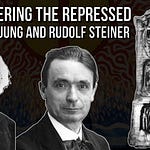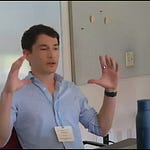Pedro Brea, Jack Bagby, and I decided to continue digging into Plotinus—specifically the Sixth Ennead—focusing on the relationship between the One and the Intellect, and between the World-Soul and individual souls. Why and how does the One overflow into the Many? We also read a helpful chapter by Gina Zavota titled “Plotinus’ ‘Reverse’ Platonism: A Deleuzian Response to the Problem of Emanation Imagery.”
I began by posing a question to both Pedro and Jack: what is Plotinus’s relevance today? Are we drawn to him purely for historical reasons, like curators of ideas perfecting and preserving a museum exhibit, or is there something alive in his thought—something that can still catalyze our contemplative life, instigate self-transformation, and contribute to contemporary metaphysics? I suspect there is indeed plenty that still pulses in Plotinus’s vision. The challenge is to square his multi-layered depiction of reality with our contemporary knowledge—physics, cosmology, evolutionary theory, etc.
After hearing Pedro and Jack’s initial impressions, I respond to Pedro’s point about how Plotinus integrates metaphysics and ethics. I love that he emphasized the idea that to know the truth, we must become like it. For Plotinus, knowledge entails self-transformation, aligning with the Good. It is a form of theosis or divination, much like the Eastern Orthodox understanding of the liturgy not as a representation of truth but as its enactment. This also relates to later Neoplatonists, like Iamblichus and Proclus, who emphasize the philosophical import of ritual.
Turning to Jack’s comment that The Enneads sometimes feel like it was written in a “fever dream,” I agree that it can be disorienting. Plotinus writes in response to mystical experience, so he admits we can only grasp things fragmentarily with our finite minds. Yet he has an unshakable sense of everything overflowing from a single Source. And whether the Source is a cause, or a creator, or an overflow—we can talk about the metaphors Plotinus uses to describe how the still Source nonetheless becomes, how cause becomes effect. Or maybe even saying “cause” is already too much… We can have an intuitive, almost revelatory sense of oneness and the systematic nature of knowledge and ideas. But in practice, when we try to write about it, it’s inevitably fragmentary. I couldn’t help but feel that—even though Plotinus was writing in the third century—it resonates so deeply with the German Idealists and Romantics. Take Fichte, for example. The whole idea of the overflowing of intellect from the One, and intellect generating itself through its turning back to contemplate the One—it reminds me so much of Fichte’s dialectical account of the “I” and the “not-I.” That whole process of self-positing, where the self is generated through a kind of differentiation from itself. The fragmentary nature of Plotinus’s writing is also convergent with (and perhaps influential for) the style of the Romantic fragment, which the Schlegel brothers emphasized. Romantic philosophy is all about the fragment. That’s not to say there isn’t system—it’s just that fragments are the best we can do to capture a thought on the page, like a leaf exfoliating from a plant. Each fragment is an expression of the archetype of the plant, but also a unique facet of the oneness of that archetype.
Pedro asked about the importance of participation, leading me to lay out how the concept of participation morphs historically from Plato through Aquinas to Schelling and the Romantics (Jacob Sherman has written a great genealogy of participation that tracks this development). Where Plato treats participation as a sort of “copying” of Forms, Aquinas reframes it more existentially, while the Romantics treat it as co-creation—where the boundaries between creature and creator soften and even dissolve. It is that more co-creative sense of participation that I favor, which somewhat meshes with Deleuze’s idea of the virtual and actual. I do, however, remain concerned that if we replace essence entirely with events, we end up with a nominalism that might undercut our sense of reality’s moral and metaphysical depth dimension. I want an account of real form and value that is robust enough to avoid mere relativism.
I also suggest there may already be a “reversal of Platonism” in Plato’s own dialogues. This comes through especially in the role of the Receptacle in the Timaeus (Tim Jackson and I discuss this in our dialogue on Timaeus). Then, in Plotinus, I notice how contemplation is only possible because the One overflows; the One becomes “Good” in that act of self-outpouring. That suggests the One’s “superabundance” is enhanced by the many returning to it via their contemplation of it. The intellect, Soul, and all of Nature’s beings each, in some way, contemplate their return to the One, thereby enabling it to continually become richer. I label this a co-creative notion of participation—though I admit it is not always spelled out this way in Plotinus’s own texts. I bring in Whitehead as a way to reinterpret this idea: the contemplation of the One by the many can, paradoxically, enhance the value realized in the One.
I turn to the role of Logos, linking it to the mediation between the One’s unity and the multiplicity of bodies, but I suggest we consider how the Incarnation might reconfigure that relationship in ways Plotinus might not have fully accounted for. I mention Plotinus’ stirring comment about erasing bodily boundaries through contemplation—“the lines which bound bodies come to be as if they fell from my contemplation.” It is as if he is stepping into the perspective of the Soul, as the power that shapes living bodies, and through contemplative activity he is in a sense “unfalling” or reversing the fall by remembering that the boundaries between bodies are ultimately illusory.
I return to Pedro’s mention of Plotinus’ psychological method, stressing that we must invert our attention, first going inward, not to retreat from the world but to understand it aright—recognizing that if we view extended sensible bodies as the ultimate or even just as an independent reality, we fall into delusion. Instead, Plotinus calls us to grasp how Soul gives shape to bodies. So to interpret the physical world properly, we need to go inward and see that the intelligible nature of the Soul stands at the root of perception. At the same time, I suggest that if we read it freshly, there might be a “co-creative” dimension: physicality need not be a mere reflection of intelligibles but the expression of an ongoing metaxy were the sensible domain is not so much illusion as it is the play of light on the surface of astral waters, a reflection of the superabundant luminosity of the One. If we can calm the surface of the soul via contemplative practice, it becomes transparent to what lies beyond it.
Pedro and I both mused on whether time-based metaphors are better than spatial ones for describing Plotinus’ hypostases. In Whitehead, we could say real potentiality is in the past; actualization is in the present; pure potentiality is in the future. Events do not unfold in a fixed container of space—space arises out of the wake left by events or actual occasions. From the World Soul’s perspective, time is a whole; from our bodily perspectives, we see it in parts, as if it were a line, just one damn day after the next, rather than as a moving image of eternity.











